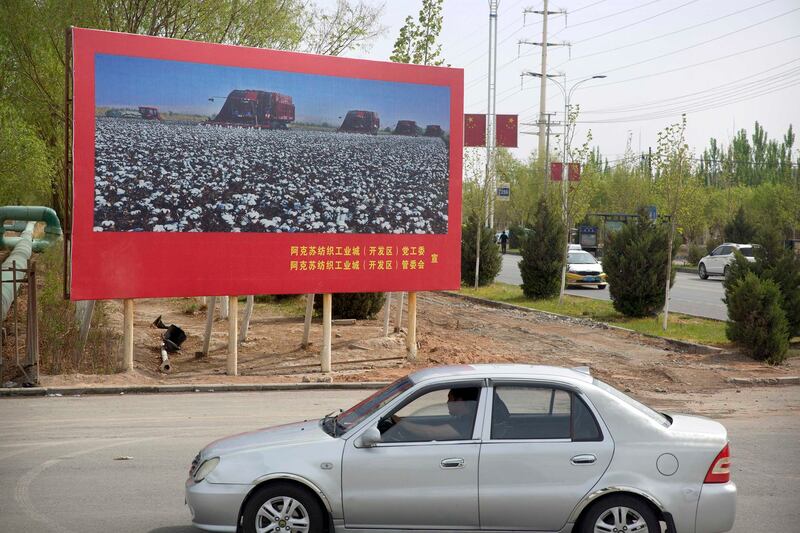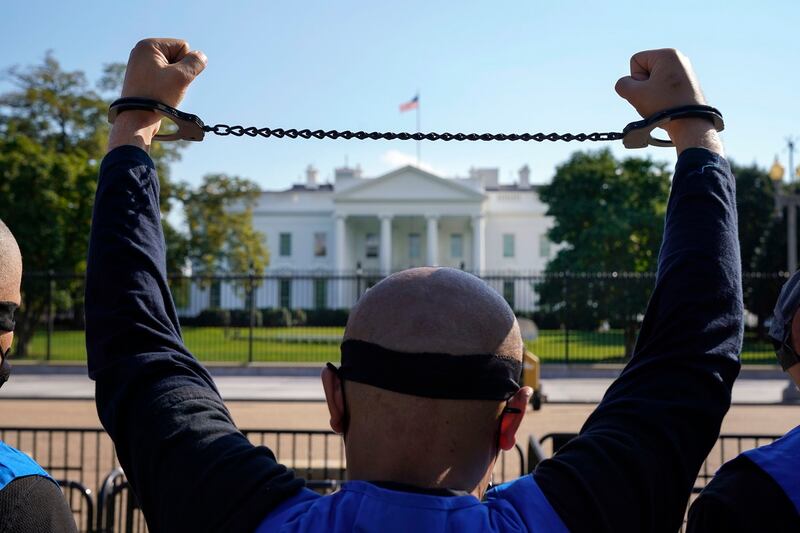The U.S. Customs and Border Patrol has already blocked nearly $500 million worth of imports from entering American ports this year because it was made “wholly or in part” by Uyghur forced labor, the agency’s acting head said at an event in Washington on Tuesday.
The move comes as more Western governments are clamping down on companies whose products and supply chains involve forced labor by the mostly Muslim Uyghurs in Xinjiang, the far western part of China.
At the Forced Labor Technical Expo at the Ronald Reagan Building and International Trade Center, acting CBP commissioner Troy Miller launched a new website that tracks shipments blocked due to forced labor and said that 3,605 shipments worth $816 million had been blocked due to suspected forced labor across all of last year.
But he noted that the value of blocked shipments this year had already reached nearly two-thirds of last year's figure, with some $496 million worth of imports across 1,910 shipments blocked before Feb. 26 thanks to the December 2021 Uyghur Forced Labor Prevention Act.
“That being said, shipments identified for further examination under UFLPA represent 0.01% of all shipments entering the U.S. since the implementation of the act,” he said. “Overall, this obviously a very small number of shipments subject to CBP’s enforcement actions.”

The agency’s job is a balance of stopping shipments linked to forced labor while also “swiftly” processing legitimate cargo, Miller said, adding that he wished to see the number of intercepted shipments go down as U.S. businesses learn they risk losing their shipments.
“As required by law, we continue to take enforcement action to inspect and detain goods when we receive credible allegations that goods are connected to Xinjiang,” he said, but “importers must take responsibility to know their supply chains and address the risk of forced labor.”
‘Orders come from the top’
The event also heard from victims of forced labor.
Nury Turkel, a Uyghur-American and chairman of the United States Commission on International Religious Freedom, told the event that he grew up alongside his parents in forced labor camps in China’s Xinjiang Uyghur Autonomous Region and that forced labor had been used by Chinese authorities “for as long as I remember.”
He emphasized that it was official government policy, and said he was dismayed by American companies that say it is hard to police supply chains.
“Papering over forced labor in your supply chains is no longer an option,” Turkel said. “Chinese companies’ use of Uyghur forced labor is not a matter of lax enforcement or government collusion with corrupt businesses. The fact is that the Xinjiang officials fill hundreds of camps with millions of people, and the orders come from the top.”

Such forced labor was enforced through the use of “torture, rape, forced sterilization, abortion and injection with unknown drugs,” he said, with authorities in Xinjiang openly promoting forced labor.
Their ads, he said, promised that “workers have been trained with a semi-military style,” were “disciplined” and, in case a business was still not convinced, “come with a police minder to prevent any trouble.”
“The ads offer a guarantee that the workers will not be job-hopping,” Turkel said. “They will not be allowed to leave the job.”
Technological help
A number of companies at the event promoted technology they said would help businesses better identify forced labor in their supply chains, including SourceMap, which helps businesses track production sources from "end-to-end," and Verité, which screens suppliers for signs of forced labor by focusing on the recruiters they use.
CBP Executive Assistant Commissioner AnnMarie Highsmith said forced labor in merchandise flowing into the United States impacts 28 million people worldwide, and that while technology might help identify it, companies still had to be proactive about trying to eliminate it.
“It is incumbent upon us as leaders in our international trade space and in our global supply chains to take affirmative actions,” Highsmith said, in order “to better trace merchandise through the supply chains.”

She said she was encouraged that blockages of shipments under the Uyghur Forced Labor Prevention Act since 2021 had caused some U.S. companies to move “operations out of the Xinjiang Uyghur Autonomous Region and into other areas of China, and other areas of other countries, such as Vietnam, Malaysia, and Thailand.”
“We can safely say that we’ve done a lot of good. But we can do better, and we can do more,” she said, explaining CBP’s ultimate aim was to stop such shipments arriving in the United States at all. “Our goal is to normalize due diligence with regard to forced labor in supply chains.”
“I’m really sorry to tell you,” Highsmith added, “there’s no magic wand that will tell us instantly there’s forced labor in the merchandise; there’s no technology that’s going to replace due diligence.”
Edited by Malcolm Foster.
